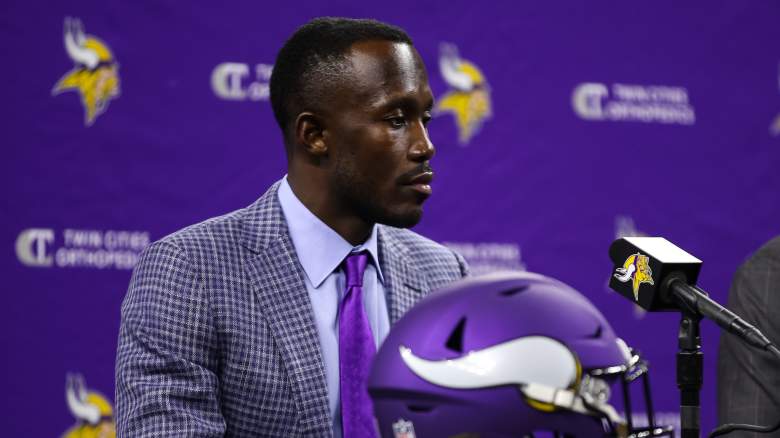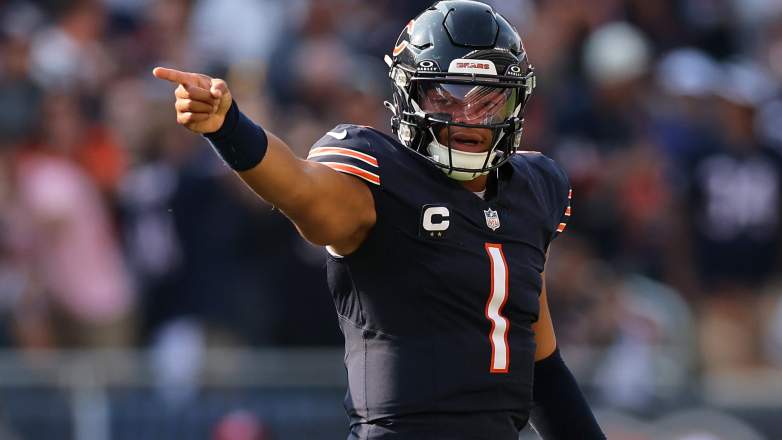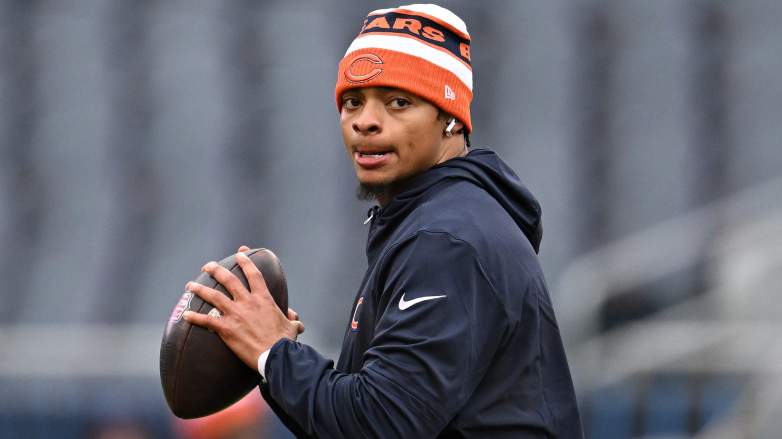
Getty General manager Kwesi Adofo-Mensah of the Minnesota Vikings.
The Minnesota Vikings appear all in on drafting their QB of the future in April, but there was another viable option on which the organization chose to pass.
Kirk Cousins signed with the Atlanta Falcons almost immediately after free agency opened, leaving the starting job vacant in Minnesota. At that time, the Chicago Bears were still shopping quarterback Justin Fields and coming to grips with the fact that a second-round return in a trade wasn’t going to happen.
Ultimately, the Bears traded Fields to the Pittsburgh Steelers for a conditional 2025 sixth-round pick that becomes a fourth-rounder if he plays 51% of the team’s offensive snaps in 2024. Chicago accepted that minimal return, at least in part, because general manager Ryan Poles wanted to deliver on his intention to “do right” by Fields.
As it turns out, what that meant was to move Fields as quickly as possible to one of four destinations that the QB determined were best for his future. Pittsburgh was one of them, though so was Minnesota, according to Brooke Pryor of ESPN.
“The Steelers were one of four teams on Fields’ radar prior to the start of free agency, along with the Vikings, Raiders and Falcons, a source familiar with Fields’ thinking said,” Pryor wrote on Friday, March 29.
Vikings Could Have Acquired Justin Fields for Day-3 Draft Pick

GettyQuarterback Justin Fields, formerly of the Chicago Bears.
It is unclear if the Vikings ever engaged in talks of any kind with the Bears as to a potential deal for Fields, though it strains credulity to believe that general manager Kwesi Adofo-Mensah and head coach Kevin O’Connell weren’t at least aware of Fields’ interest in Minnesota as a top-four destination.
The math on a deal for Fields would have been complicated for the Vikings, though the cost on the front end would undoubtedly have been lower than what the team is going to spend on securing a quarterback in the coming NFL draft.
To land Fields, Minnesota presumably would have needed to best the Steelers’ offer. However, they could have accomplished that by offering Chicago just a fifth-round pick with conditions that bumped it up to a fourth-rounder.
Instead, Minnesota traded two seconds and a sixth to the Houston Texans earlier this month to acquire the No. 23 overall pick. Most analysts expect the Vikings did so because they intend to package that selection, along with their No. 11 pick, to try and move up into the top five and draft a prospect like Drake Maye or J.J. McCarthy. Doing so could ultimately cost Minnesota a 2025 first-rounder as well, depending on how high the Vikings attempt to trade and what competition exists for that draft position.
Vikings Avoided Significant Financial Decisions at QB Position by Passing on Chance to Trade for Justin Fields

GettyFormer Chicago Bears quarterback Justin Fields.
In the near future, however, Fields is likely to become considerably more expensive.
The Steelers traded for $3.2 million in remaining salary on Fields’ $18.9 million rookie contract, which is a bargain for the former No. 11 overall pick. However, they also traded for the decision on Fields’ $25.7 fifth-year option, which the team must make by early May.
If Pittsburgh doesn’t exercise that option, Fields will hit free agency in March 2025. At that point, the former Bears starter could become incredibly expensive, as Spotrac projects his market value at north of $47 million annually over a new six-year deal ($283.2 million total).
Minnesota avoided all those significant financial decisions by choosing not to involve itself in a trade for Fields. The Vikings also avoided the risk of trading a Day-3 pick for one year of a quarterback they might not want to re-sign, at least not at Fields’ desired number, which would have resulted in restarting the quarterback search again in 2025.
If Minnesota lands a top rookie prospect, that player will be on a cost-controlled rookie deal for four years and the contract will include a fifth-year option for the Vikings. However, the team may now need to rely on Sam Darnold to start in 2024, which isn’t ideal for a roster loaded with so much pass-catching talent.